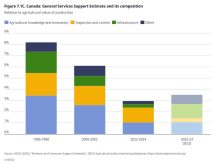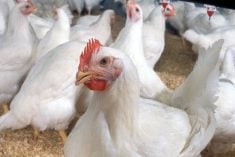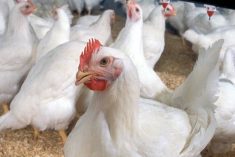The supply-managed sector can survive the proposed Trans-Pacific Partnership if the federal government makes good on promises to control mislabelled imports and provide financial compensation.
Robin Horel, president and CEO, Canadian Poultry and Egg Processors Council, told the Senate agriculture committee the industry has been in talks with federal officials about border controls and programs to support processors since the proposed deal with 11 other countries was reached last year.
The government’s plan “will provide clarity around the future of supply management,” he said.
Tighter border controls will likely include requiring certification for spent fowl, preventing the circumvention of import quotas by adding sauce packets to chicken products and excluding supply-managed products from the Duties Relief Program.
Read Also

KAP flags risky trade for Manitoba farmers
Tariffs, market access uncertainty, trade diversification and export infrastructure top the agenda at Keystone Agricultural Producers (KAP) annual meeting.
Robert DeValk, executive director of Further Poultry Processors Association of Canada, noted the RCMP has investigated reports of imports of high-priced broiler chicken labelled as cheaper meat from older chicken, a move he supported.
“That is definitely wrong and it hurts our industry,” DeValk said.
The association understood the RCMP had investigated, but DeValk said he had no details to share.
“There are things going on there that need to be fixed up,” he said.
His group has worked with U.S. exporters to develop a certification program to prevent spent fowl being passed off as broiler meat. It could also be used by Canadian officials to ensure imports are properly labelled.
The Duties Relief Program needs improvement to cover cases where Canadian product is not available for processors, who then turn to imports to fill specific needs, he added.
The TPP would grant increased access during the first 18 years to imports of dairy and poultry products. The previous government promised financial compensation to farmers and assistance to processors to developed markets for their products.
“Government officials acknowledge that these measures can be put into place prior to the TPP being adopted,” Horel said. He added programs for farmers will be based on compensation while programs for producers are based on adjustment.
Agriculture Minister Lawrence MacAulay has said the Trudeau government will provide the aid promised by the former Harper government.
Poultry processors deal with consumer preference for breast meat and wings through imports above what is grown in Canada, he said, and other supply-managed industries grapple with similar issues.
“We are net importers of shell eggs and are both importers and exporters of processed egg products,” MacAulay said.
DeValk said consumer demands can change rapidly and that means imports are occasionally needed to provide for these markets. He noted the imports are only temporary measures, intended to give the domestic industry time to build its own capacity.
“Imports can be very helpful in dealing with changing markets,” DeValk said. “That additional access that the TPP provides us over a period of 18 years will be very important for further processors.”
The TPP will open the Mexican market to Canadian poultry, he added, something that wasn’t included in the NAFTA agreement.
“That could open up a market as big as Canada, if not bigger, to our poultry industry,” he said.
DeValk said the further processors are asking the government to make sure Mexican market access is a reality and remove any remaining non-trade barriers to allow the Canadian industry to access it.
“We should look at it,” DeValk said. “We shouldn’t shy away from it.”















